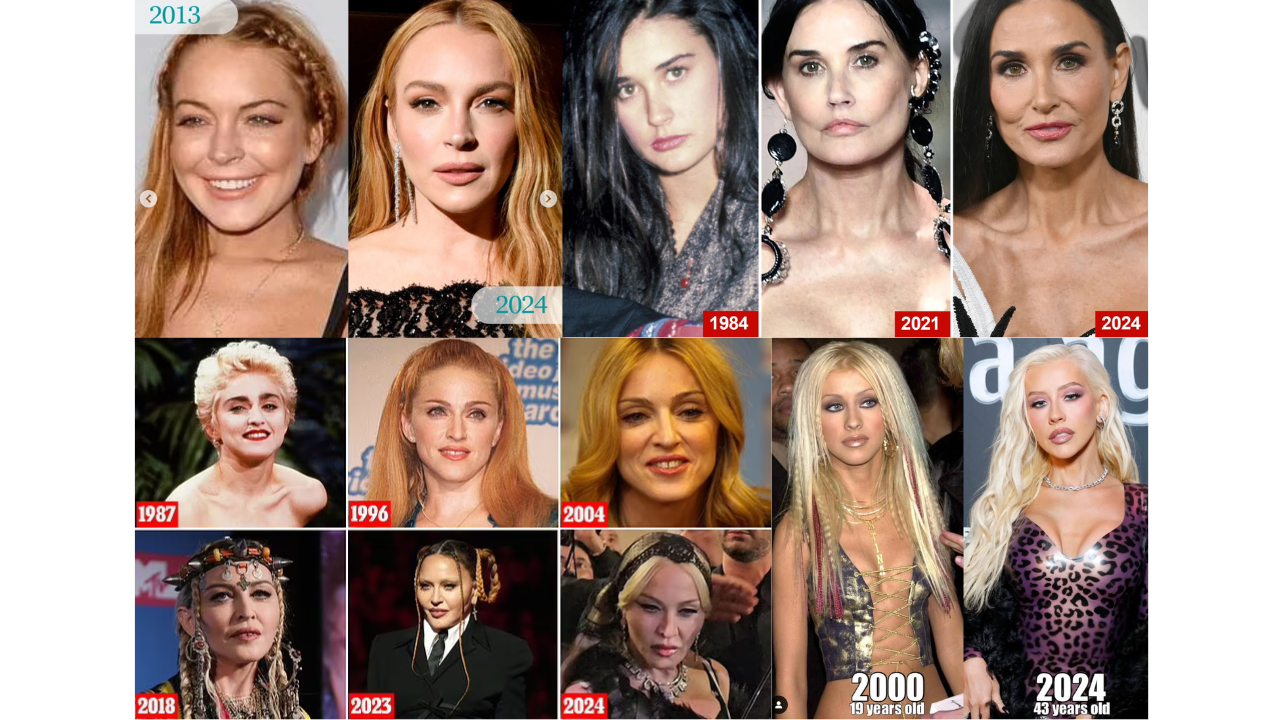is aging gracefully just another way to police our bodies?
navigating society’s expectations and our own mortality
I’m Tuğba, a Greek-Turkish artist living in Berlin - as slow as possible is a newsletter exploring the in-between spaces of our lives that we see but often do not notice. Interested in reading more of my work?
"Behind Madonna's incredibly youthful face as she turns 66 but looks 21"
“Secrets of Demi Moore's TOTAL face swap: Hollywood legend is 'aging backwards' and top UK cosmetic doctor thinks he knows why”
“Lindsay Lohan looks better than ever at 38, according to a cosmetic surgeon”
“Christina Aguilera’s drastic transformation as fans are convinced she’s ageing backwards”
"It is a vampire facial."
"It is just an extreme face lift."
"No, it is Botox."
"I think it is fillers."
"No, no, it is this Sculptra! Hollywood’s best-kept secret!"
"Wait, maybe it's a chemical peel?"
"Could it be laser resurfacing?"
"Actually, it could be collagen threads."
I find myself going down a rabbit hole, trying to uncover the magic treatment that transformed Madonna, Christina Aguilera, Demi Moore, and Lindsay Lohan.
Yet, after an hour of searching, I’m no closer to finding answers. All I’ve gained is a strange sense of pressure—pressure to age gracefully. But how does one age gracefully? What does aging gracefully even look like? How can I tell if I'm doing it right? Are there judges who evaluate whether we are aging gracefully?
The phrase aging gracefully is often used with positive intentions, but it comes with a host of expectations. It creates a constant balancing act between maintaining our appearance while pretending not to care too much about it, all to earn the label of having “aged gracefully.”
We invest significant time and money in this process while rarely admitting to it. There is always a heightened awareness to strive to be “graceful” but not get caught simply “aging.” This perspective often overlooks the fact that not everyone experiences aging in the same way due to health conditions, socioeconomic status, and the oversimplification of what aging should look like for everyone.
There is undoubtedly more pressure on women to “age gracefully”, while men are often expected to "age like fine wine." We could debate which expectation is worse, but I believe men also face significant pressure these days. I’ve seen it not only among my friends but across social media as well.
That said, the anxiety around aging isn’t new—it’s deeply rooted in a fundamental fear of death.
Every wrinkle, gray hair, change in our body, and decline in our health serves as a reminder of the fleeting nature of life. These signs of aging in ourselves and those around us remind us of our own mortality and the fact that we are all moving towards death.
Uff—deep, I know!
Our modern culture often treats aging as something to resist or "fix." This obsession with staying young can easily become a coping mechanism to avoid confronting the reality of death. With the rise of social media, this denial is amplified. Youth is glorified, while aging—and the mortality it represents—is marginalized. While medical advancements are incredible, they also foster the belief that we can control or delay death, leading us to view it as a problem that needs to be solved—further encouraging a hyperfocus on longevity. In many societies, death has been removed from daily life, with dying typically occurring in hospitals, and the topic is often considered taboo.
When my grandma passed away fourteen years ago, I was 26. I flew from the UK to my mother’s small hometown, Xanthi, in Northern Greece. The ambulance had arrived earlier and confirmed her death after a heart attack, but her body remained at home until the following day when we would take her to the nearby graveyard.
When I arrived late at night, she lay on the floor, fully covered by a white sheet. Her loved ones and neighbours crowded the flat, crying, praying, and sharing stories of what a wonderful person she was. This continued throughout the night.
The next day, my great-grandmother prepared her daughter’s body for burial, washing her in the courtyard. Later, my grandmother was placed in a coffin and carried to the graveyard by her loved ones.
I remember the funeral so vividly. Growing up in Germany, I had never been so close to death before. The closest I’d come was walking past a graveyard, deliberately avoiding looking at it. I feel deeply grateful that I was able to witness and participate in this final step of my grandmother’s journey.
An inability to accept aging and death as natural parts of life can lead to chronic anxiety and persistent dissatisfaction. It creates a continual struggle to gain control over something fundamentally beyond our control— the desire for control and the illusion of having it.
Aristotle, the Greek philosopher, emphasized that a good life leads to a good death. He believed that the fear of death comes from a failure to live life fully.
Take that in…
"It is not death that a man should fear, but he should fear never beginning to live."
Aristotle
I love how Aristotle emphasizes that living a full life can ease the fear of death. Simply telling someone to “accept death” isn’t helpful; the fear of death is natural because it represents the unknown. However, if we fail to live fully—if we don’t focus on what truly matters—our fear of death can become overwhelming. This, in turn, fuels an unhealthy fear of aging and an obsession with staying young.
I like to think of life as a beautiful symphony composed of different movements, each with its own tempo and emotion. It begins softly, builds to powerful crescendos, and ultimately transitions into a gentle finish. While there is a beginning and an end, what makes a symphony so beautiful is how each note and instrument comes together to tell a story. Life is much the same; it may have an ending, but it is the rhythm of each day, the choices we make, the relationships we nurture, and the challenges we face that make it meaningful.
Every experience adds something unique to our life's symphony. Some days are calm and harmonious, while others are filled with intense emotional moments. Ultimately, it is about the composition as a whole—living authentically and playing our part in the collective rhythm of life. When the final note is played, it won’t matter if we still look like we’re 30. What will matter is how we lived and what we experienced.
I turned 40 last year, and I’ve shared my struggles with aging before.
While it's impossible to avoid the societal pressure to age gracefully, I hope to rise above the noise in the coming years and make more intentional choices regarding my aging process, ensuring those choices come from a healthy and conscious place.
I am not suggesting that we should all refrain from purchasing the latest anti-aging creams, going to the gym, or avoiding cosmetic procedures—each to their own! I am simply advocating for greater awareness of the constant dissatisfaction accompanying aging and the aggressive pursuit of longevity.
There’s so much more to life.
Let us remember, aging is a privilege—one that not everyone is granted.
Take care!
Your friend Tuğba
How can I show some love for what you do?
as slow as possible is a free, hand-crafted publication that relies entirely on your support - like, comment, restack and recommend. It always brightens my day to hear from you 🫶🏼
most loved posts:










As I was reading this, I found myself saying 'but, but, but, but what about the fear of becoming irrelevant and unseen'? That is more frightening than death!
I think by the time people, especially women, are actually looking at death, they have moved past the phase of irrelevance and have moved to acceptance. But until that acceptance phase - the old crone phase - many fight to stay in a phase of life they don't belong. They are not 10, 20, 30 years younger and the compulsion to try to make your face appear decades younger than the rest of you is a sad commentary on society.
If there are wrinkles and saggy chins - and you are a woman - you are out of the game. And that applies to most every game. People don't want to become irrelevant. And being alive and irrelevant is even more frightening than the unknown.
Tugba, I'm giving a program based on the principle that aging should be our chance to become more and more ourselves; that on the day we leave it would be a wonderful thing if, on that day, we can be completely at peace that we've lived life as our true selves.
The sense of aging while trying to either fight the process or denying that it is happening is, in my mind, the exact opposite of this beautiful life stage.
I had a similar experience with the death of a friend in Italy. He remained in his home for a full day after his death and we visited him there - after having spent time every day with him for three months. It soothed my soul to have that experience, which I'd never had before.
Much love, dear one.